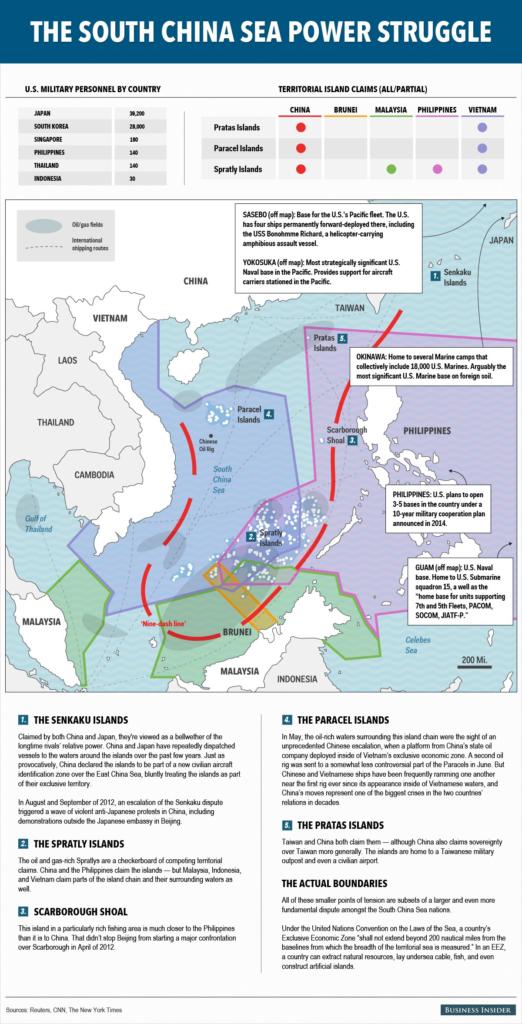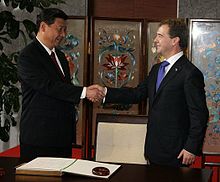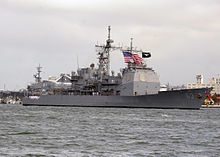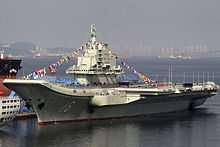
Minxin Pei wrote an article entitled “How China and America See Each Other and Why They are on a Collision Course”, which was published in the March/April 2014 issue of Foreign Affairs. Pei reviewed the book Debating China: The U.S.-China Relationship in Ten Conversations (2014) edited by Nina Hachigian.
The author of Debating China pairs one leading American expert on China with a Chinese counterpart to debate a specific bilateral issue. Nina Hachigian moderates the conversations by asking key questions that the participants should address. The debaters express their opinion and, in a second round, focus on their disagreements. The book then summarizes each side’s positions on issues such as human rights, climate change, military affairs, and regional security. Pei depicts the book by saying that it is “illuminating but disheartening, for those optimistic about the future of the United States-Chinese ties who will find little to cheer in these pages.”
The United States and China have the most important bilateral relationship in the world. If that relationship deteriorates in the years ahead into open conflict, the whole world will be impacted negatively. Whether the United States or China chooses to cooperate or confront each other will affect billions of people throughout the world. For many years many observers believed that the two countries were neither friends nor enemies. However, the remarkable expansion of Chinese power (militarily, economic, diplomatic) and the global financial crisis that impacted the United States and Europe have led Chinese leaders to believe that the United States and the West are declining.

This writer wrote a 480-page book entitled America in Decline (2014)
The gap between the United States and Chinese power has narrowed
The gap between the United States and Chinese power, which was narrowing before the financial crisis, has closed even further. In 2007, for example, the economy of the United States was four times as large as that of China, but by 2012, it was only twice as large. China’s Gross Domestic Product (GDP) was $202 billion in 1980 and in 2015 was $10.983 trillion. The GDP of United States in 2015 was $17.947 trillion. China’s economy grew 6.9% in 2015, a 25-year low, but still very impressive. China’s economy is slowing down and its stock market has fallen sharply, The Chinese corporations carry too much debt and some banks are experiencing severe financial problems.
The United States and China have the two largest economies and military budgets in the world. They lead the planet in Internet users. Obviously, a large shift in the balance of power between China and the United States will bring a change in the attitudes and behavior toward each other by the people and their leaders.
China, together with Russia, has achieved military superiority over the United States and it is exercising imperialism in the East and South China Seas
China’s rapid modernization of weapons and expansion of its military as well as the current cyber and currency warfare against the United States have created a great deal of concern among Americans. Over the last few years, China has stolen America’s most valuable military and industrial secrets. The cyber attacks conducted by the People’s Liberation Army have increased in spite of the complaints by the United States government to China.
China is implementing a more aggressive and assertive foreign policy since 2010. It is engaging in territorial and maritime disputes with its neighboring countries. In addition to claiming all of Taiwan, China has been involved in many other international territorial disputes with India, Vietnam, Malaysia, Indonesia, Taiwan, Japan, and the Philippines.
China is claiming ownership of several small islands and reefs in the East and South China Seas such as the Japanese’s Senkaku Islands and the Philippines’ Scarborough Shoal Island. The Scarborough Shoal Island, as shown in the map on the next page, is very far from China and very close to the U.S. ally the Philippines. The Senkaku Islands involves a territorial dispute over a group of uninhabited islands that belong to Japan. These islands are called Diaoyu Islands by the People’s Republic of China (PRC) and Tiaoyutai Islands by the Republic of China or Taiwan.
The People’s Republic of China started taking up the question of sovereignty over the islands in the latter half of 1970 when evidence relating to the existence of oil reserves surfaced. Taiwan also claims the islands. The territory is close to key shipping lanes and rich fishing grounds, and there may be oil reserves in the area.

China is claiming the Spratly Islands but so are Malaysia, Indonesia, and Vietnam. China is also claiming the Paracel Islands which is claimed by Vietnam. The surrounding waters of the Paracel Islands are rich in oil. A serious conflict started between Vietnam and China when China placed a platform to search for oil inside Vietnam’s Exclusive Economic Zone. China violated the United Nations Law of the Sea Treaty which it had signed. According to this treaty, China could not search for oil within 200 nautical miles of Vietnam’s boundary, but the Chinese did it anyway.
Incredibly, China is claiming ownership of almost the entire maritime and air space of the South China Sea. China’s neighbors and the United States have rejected this illegal claim and the violation of international law. Beijing has been threatened by the response of the United States to their new imperialism and has raised the possibility of conflict.
The United States-Chinese relationship is full of distrust and it is deteriorating rapidly
The American and Chinese scholars agree that the United States-Chinese relationship is full of distrust, especially as nationalism in China has increased. The Chinese debaters believe that the distrust will persist as long as China’s domestic political system remains unchanged. There is complete disagreement among the American Chinese scholars with regards to China’s military modernization, human rights, and regional security.
A Chinese scholar insists that China does not agree with the United States and the West on human rights because the Confucian order is based on “prescribed codes of ritual behavior” rather than fundamental individual rights. The American scholar rejects this claim saying that China needs to comply with universal norms of human rights. It is well known that China is governed by an authoritarian and oppressive communist dictatorship which suppresses freedom of the press, freedom of assembly, freedom of religion, the right to have children, and heavy restrictions in the use and access to the Internet.
Property rights are often poorly protected. Rural migrants to the Chinese cities frequently find themselves treated as second-class citizens. The United States, other countries, and NGOs frequently criticize China’s human rights record. Among the complaints are detention without trial, forced abortions, forced confessions, excessive use of the death penalty, torture, treatment of ethnic minorities (there are 56), and restrictions of fundamental human rights.
Andrew Browne wrote an article entitled “Looking to Mao, Beijing Pulls Welcome Mat for Foreigners” which was published by the Wall Street Journal on May 4, 2016. The reporter explained that the Chinese dictator Xi Jinping is pushing ideology harder than any Chinese leader in decades. Increasingly, China sees itself in ideological confrontation with the West. Browne said “Xi is promoting a strident form of nationalism… All of this adds uncertainty to the outlook for foreigners in China.”
Browne stated the following: “Restrictions on foreign publications are tightening. Time magazine has joined a growing list of growing list of foreign news websites blocked by the Great Firewall. It includes the Economist, Bloomberg, Reuters, the Wall Street Journal and the New York Times— in addition to Google, Facebook, and Twitter.
Browne pointed out that the foreign business community is complaining that their prospects are narrowing. In April 2016 Apple Inc. had to shut down its online book and movie services due to new Internet restrictions. The reporter said that the NGOs working on sensitive issues such as labor rights, legal reform, and gender equality will be monitored by the Chinese regime even more closely. Multinationals can expect a rougher ride, especially United States technological corporations. China wants to use its own technology in strategic sectors like banking and telecommunications.
Andrew Browne ended his article by stating, “Looming through the haze in the background was a portrait of Mao–the great expeller of foreigners whose ideas are making a big comeback in Mr. Xi’s more ideological China.”
Another area of irreconcilable difference pointed by American and Chinese scholars is with regard to the rapid military modernization of the Chinese Armed Forces. Over the last few years the People’s Liberation Army (PLA) has built stealth attack nuclear submarines, mobile nuclear missiles, carrier-killing missiles, an aircraft carrier, the Liaoning, and advanced jet fighters. The Chinese military has 2.3 million, and is the largest in the planet.
An article in the British newspaper the Guardian on March 4, 2016 said that the People’s Republic of China will raise its defense spending by between 7% and 8% in 2016 which was a smaller increase than the double-digit rises of the past as Beijing seeks a more efficient military. In 2015 the increased of budget of the Armed Forces was 10.1%.
The article explained that the slowdown in spending comes as president Xi Jinping wants to create a more modern People’s Liberation Army (PLA), the world’s largest standing military. At a very large military parade in Beijing in 2015 to commemorate the 70th anniversary of Japan’s World War II defeat, President XI Jinping said that the People’s Liberation Army would be cut by 300,000 to make more efficient and effective. But the parade featured more than a dozen “carrier-killer” anti-ship ballistic missiles rolling through the streets of the capital, with state television calling them a “trump card” in potential conflicts and “one of China’s key weapons in asymmetric warfare”.

China’s president Xi Jinping meets with Russian Dmitry Medvedev. Both nations are strong allies and enemies of the United States.
There is no question that the Chinese dictator Xi Jinping is promoting an extreme form of nationalism and assertiveness in numerous territorial disputes in Asia which could someday bring war with the United States and its allies. The Guardian explained that analysts stated that for a fraction of the cost of an aircraft carrier – for decades the way America projected power around the world – the DF-21D missile threatens to alter the military balance in the Pacific. At the same time, Beijing is looking to increase its own naval strength and reach, and officials confirmed in December 2015 that its second aircraft carrier – the first to be entirely domestically designed and built – was under construction. It has built up artificial islands in the South China Sea – through which a third of the world’s oil passes, and which Beijing claims almost in its entirety.

The Chinese carrier-killing DF-21D missile alters the military balance in the Pacific.
Beijing defends its actions as being within its sovereign rights and denies Washington’s assertions that they threaten freedom of navigation. Many analysts believe China’s actual military spending is significantly higher than officially publicized.
On March 5, 2014 on the first day of the National People’s Congress in Beijing, speaking to about 3,000 delegates in the Great Hall of the People, Chinese premier Li Keqiang explained the need to “build China into a maritime power.” He also said, “We will strengthen national defense mobilization and the reserve forces, place water preparations on a regular footing and enhance border, coastal and defenses.”
Stewart Leavenworth wrote that the state-run China Daily newspaper published a provocative interview with the top Chinese military advisor, Major General Qian Lihua, a former head of the Defense Ministry’s Foreign Affairs Office, who stated that a conflict with China’s neighbors could not be ruled out, with Japan being a particular problem. Denny Roy, a scholar from the East-West Center in Honolulu, said that the increase in military spending “will reinforce the image of China being assertive, of preparing to force its will upon some of its neighbors.”
The author of Debating China explained that Xu Hui, a professor with the rank of senior colonel, at China’s National Defense University, debated Christopher Twomey, who teaches at the Naval Postgraduate School. Twomey questioned why China needs to expand its military so much when it faces no threat of land invasion and none of his neighbors come close to matching Chinese power.
Judging from this book, there is clearly deeper disagreements that will play a larger role in determining the nature of the bilateral relationship. Minxin Pei wrote that “the United States and China should forget about trying to resolve their conflicts over China’s military modernization, Taiwan, human rights, and East Asian security and should instead find a way to manage them.”
Debating China shows that the United States and Chinese relationship is heading in an increasingly competitive direction. The disputes among the two nations will remain unresolved for the foreseeable future. China and the United States have failed to develop trust in the long-term intentions of each towards the other.
The Chinese scholars argued that it is Washington that needs to change its Asia policy since China is becoming more powerful. The Chinese scholars mentioned that the Chinese economy, according to the International Monetary Fund, will likely overtake that of the United States economy between 2020 and 2025.
The revelation in the book that should concern Washington the most is the degree to which the insistence by United States that it does not seek to contain China has fallen on deaf ears. The Chinese scholars, as well as Xi Jinping, the dictator who rules China, believe that the United States “will never willingly cede its global hegemony and allow China to become a great power in its own right.”
The American scholars were surprised as to how China “can accuse the United States of trying to block China’s ascent when the United States has opened its markets to China, trained hundreds of thousands of China’s best and brightest at American universities, invested billions in Chinese manufacturing, and supported Beijing’s accession to the World Trade Organization.” The Chinese scholars remained unconvinced and believe that any United States support for China was entirely for self interest.
Chinese warship tries to stop a U.S. cruiser in international waters

The guided missile cruiser USS Cowpens
Bill Gertz wrote an article entitled “Chinese Naval Vessel Tries to Force U.S. Warship to Stop in International Waters,” which was published on the Washington Free Beacon on December 13, 2013. The reporter explained that on December 5, 2013 the guided missile cruiser USS Cowpens was sailing in international waters in the South China Sea, which China has illegally claimed as its territory.

The Chinese aircraft carrier Liaoning
The cruiser USS Cowpens was following the Chinese aircraft carrier Liaoning at the time. According to American officials, a Chinese Navy vessel ordered the cruiser USS Cowpens to stop. The cruiser refused the order because it was operating in international waters and continued on its course. Suddenly, a Chinese tank landing ship sailed in front of the cruiser and stopped, forcing the U.S. Naval vessel to abruptly change its course in what it became a dangerous maneuver.
This incident is a result of China’s illegal declaration of an air defense identification zone (ADIZ) in the East China Sea. Bill Gertz wrote that General Martin Dempsey, chairman of the Joint Chiefs of Staff, had stated that China’s new air defense zone was destabilizing and this increases the risk of a military “miscalculation.”
China has dispatched fighter jets to the ADIZ to monitor the airspace that is used frequently by United States and Japanese surveillance aircraft. Both the United States and Japan do not recognize China’s air defense identification zone. The United States sent in November 2013 two B-52 bombers which flew through the ADIZ but not over the disputed islands of Senkaku/Diaoyu. However, the United States informed U.S. commercial airlines to notify China when their airplanes fly over the ADIZ. This writer believes that this was a serious mistake by President Obama since it has acknowledged the legitimacy of the Chinese air defense identification zone. Defense Department officials have said that China’s declaration of the ADIZ is geared primarily at curbing surveillance flights in the zone, which China’s military regards as a “threat to its military secrets.”
Bill Gertz wrote that Rick Fisher, a China military affairs expert, said that it was likely that the Chinese deliberately staged the incident as part of a strategy of pressuring the United States. Fisher believes that the encounter with the United States cruiser appears to be part of a pattern of China’s signaling that it will not accept the presence of American military power in its East Asian theater of influence. Fisher stated the following: “In this early stage of using its newly acquired naval power, China is posturing and bullying, but China is also looking for a fight, a battle that will cow the Americans, the Japanese, and the Filipinos.
The United States and Japan should also step up their rearmament of the Philippines. China has spent the last 20 years building up its Navy and now feels that “it can be used to obtain its political objectives.” The reporter said that the United States military has been increasing the surveillance of China’s naval forces, including the growing submarine fleet, as part of the U.S. policy of “rebalancing forces to the Pacific.” It is obvious that China is seeking to control illegally large areas of international waters where the ships and airplanes of many nations travel. The United States and its allies need to make sure that these major sea lanes, where an enormous amount of international traffic occurs, remain free.
The reporter explained that China’s state-control media reports on a regular basis that the United States is seeking to defeat China by encircling the country with enemies while working with dissidents within China to overthrow the communist regime. The Obama administration has denied the accusations of seeking to “contain” China and has made it clear that he wants to continue close economic and diplomatic relations.
A serious confrontation between China and the United States would seriously damage the enormous trade between the two nations. China has prospered economically over the last few years by focusing its economy in manufacturing low-cost products for foreign markets. Chinese exports to the United States increased drastically, particularly after China, with the help of the United States, joining the World Trade Organization (WTO) in 2001.
On May 3, 2016, an article in the New York Times explained that American businesses and consumers purchased $481.9 billion in Chinese products in 2015, about 1/5 of all imports and the most from any country. The United States sold $116.2 billion in goods to China in 2015, including aircraft parts, semiconductors, automobiles– all high value industries in which workers earn high wages. There is a large deficit in the United States trade with China. A 2013 study estimated that China’s rise had eliminated at least one million factory jobs in the United States.
Conclusion
It is obvious that China would like to change the existing world order and that it would confront and challenge the United States in the near future. The United States needs to improve its alliances with China’s neighbors and strengthen its military force in order to counter any Chinese action that might threaten to undermine the existing world order.
China declared an air defense identification zone in November 2013 that overlaps with those of Japan and South Korea. This has increased the risk of conflict with the United States and its allies. China should not be allowed to get away with claiming most of the South China Sea as its territory in violation of international law.
It is not helpful that Obama has continued reducing the Pentagon’s budget. Obama has allowed a troubling state of preparedness of U.S. military forces, which is the result of his deep cuts to personnel, equipment and training – cuts which are hard to fathom in our increasingly precarious world.
It is a policy which sends a message of extreme weakness not only to China, but to Russia, Iran, North Korea and other countries that are enemies of the United States. It is not helpful that the president has stated more than once that he wishes to abolish the nuclear arsenal of the United States since that also sends a message of weakness.
More importantly, President Barack Obama and Congress need to quickly put our financial house in order. The nation cannot continue to endure enormous annual deficits and growing federal debt. Allowing China to continue to purchase our debt, which now holds approximately $2 trillion U.S. treasure bonds, is against U.S. national security.
As Hillary Clinton once stated, “how do you deal toughly with your banker?” As China continues to grow stronger, it will seek to modify the existing world order. Both China and Russia have already stated that they want to replace the dollar as an international currency. If they succeed in this endeavor, the economy of United States will be seriously hurt. The United States cannot allow China to continue stealing its most precious military and industrial secrets.
This writer believes that China and its ally Russia are increasingly a gathering threat to the national security of the United States. Hopefully, the next president would strengthen rapidly America’s nuclear arsenal and Armed Forces before it is too late. It is very important for our next president to remember President Ronald Reagan’s vision of peace through strength!
